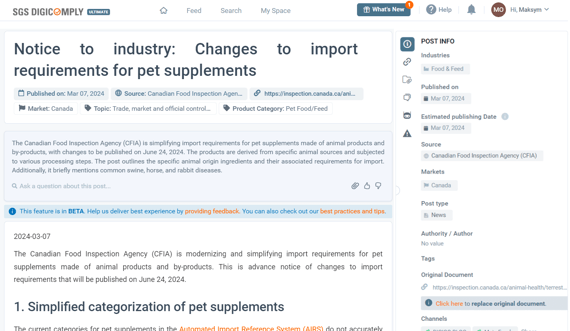The Canadian Food Inspection Agency (CFIA) is embarking on a significant overhaul of the import requirements for pet supplements derived from animal products and by-products. Slated for implementation on June 24, 2024, these changes represent a pivotal shift towards modernizing and simplifying the regulatory framework governing pet supplements. This comprehensive guide delves into the nuances of the updated import requirements, elucidating the technical details and verified facts pertinent to industry stakeholders.
This notification was timely identified and is available to users through the SGS Digicomply Regulatory Intelligence Hub. Feel free to get in touch now to learn about implementing the Regulatory Intelligence Hub for your company. Or explore the demo and try this tool in action.
Streamlining Categories for Clarity and Efficiency
One of the cornerstone changes announced by the CFIA involves the restructuring of the categorization system for pet supplements in the Automated Import Reference System (AIRS). Previously, the system's categories were criticized for not accurately reflecting the diverse range of pet supplements available in the market. Responding to this, the CFIA has streamlined the classifications into three distinct categories, effective from June 24, 2024:
-
Pet Supplements with No Animal Origin Ingredients: These supplements can be imported from any country, provided that the label or a detailed manufacturer's ingredient list accompanies them. This category facilitates the importation of plant-based or synthetic supplements without the complexities associated with animal-derived ingredients.
-
Pet Supplements Containing Only Highly Processed Animal Origin Ingredients: This category includes supplements with ingredients like albumin, chondroitin sulphate, and collagen—substances that undergo extensive processing to remove any biological risks. The detailed processing steps ensure the safety and quality of these ingredients, mitigating concerns related to animal diseases.
-
Pet Supplements Containing Animal Origin Ingredients That Are Not Highly Processed: Supplements falling into this category include those with ingredients like meat, organs, and bone meal. Given the higher risk associated with these less processed ingredients, stricter import controls are applied to safeguard against the transmission of animal diseases.
Innovations in Zoosanitary Certification
A critical component of the new regulations is the adaptation of zoosanitary certification processes. The CFIA's revised approach allows for greater flexibility and efficiency in certifying pet supplements for import. Key features of the new zoosanitary certification include:
-
Ingredient Specificity: The official veterinarian from the exporting country can now explicitly list or exclude specific ingredients in the zoosanitary certificate, tailoring the document to the actual contents of the shipment.
-
Consolidated Certification for Similar Products: Importantly, different types of pet supplements within the same shipment can be certified under a single zoosanitary certificate, provided they belong to the same processing category (highly processed or not). This consolidation aims to streamline the importation process, reducing administrative burdens for importers.
Detailed Import Requirements
The CFIA has meticulously outlined the import requirements for both categories of pet supplements, focusing on disease prevention and control. For supplements containing highly processed ingredients, the agency specifies conditions such as the source of the ingredients (e.g., species and country of origin) and the processing steps required to mitigate BSE risk and other diseases.
For products with non-highly processed animal origin ingredients, the requirements are even more stringent. These stipulations include detailed processing and sourcing conditions designed to address a broader range of diseases, such as African Swine Fever and Highly Pathogenic Avian Influenza, reflecting the CFIA's commitment to preventing animal disease transmission through imported pet supplements.
Conclusion
The CFIA's forthcoming changes to the import requirements for pet supplements mark a significant step forward in the regulation of animal-derived products in Canada. By simplifying the categorization system, refining the zoosanitary certification process, and imposing rigorous import conditions, the CFIA aims to facilitate trade while upholding the highest standards of food safety certification, animal, and public health. Stakeholders across the pet supplement industry must now prepare to navigate these changes, ensuring compliance by the June 2024 deadline to continue meeting the demands of Canadian pet owners for safe and effective pet supplements.
For more detailed inquiries, stakeholders can reach out directly to the CFIA or utilize the SGS Digicomply platform for comprehensive insights and updates. Feel free to get in touch now to learn about implementing the Regulatory Intelligence Hub for your company. Or explore the demo and try this tool in action.





.webp?width=1644&height=1254&name=Food%20Safety%20Dashboard%201%20(1).webp)
